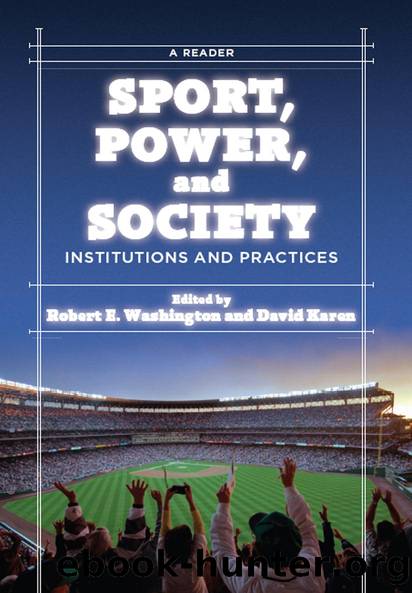Sport, Power, and Society by Robert E. Washington

Author:Robert E. Washington [Washington, Robert E.]
Language: eng
Format: epub
ISBN: 9780429976841
Barnesnoble:
Publisher: Taylor & Francis
Published: 2018-04-19T00:00:00+00:00
Conclusion
Westwood (1990) has argued that as âa counter to racism black masculinity is called up as part of the cultures of resistance developed by black men in Britainâ (p. 61). This article has shown how for a number of Black men, sport, and in particular cricket, can provide a modality through which Black cultural resistance to racism can be achieved. Sports provide an arena whereby Black men can lay claim to a masculine identity as a means of restoring a unified sense of racial identity, freed, if only momentarily, from the emasculating discourses imposed by the ideologies and practices of White racism.
However, we should be cautious not to overstate unproblematically the benefits of such sites of resistance. For one, Black women often occupy marginal positions within sports clubs such as the CCC (especially those that do not have womenâs teams), which are perhaps more accurately described, as I have tried to make clear throughout, as Black menâs cricket clubs. Without acknowledging such limitations, the complex positioning of Black women, in particular, within âwhite supremacist capitalist patriarchal societiesâ (hooks, 1994) gets overlooked. Thus, any claims for such cultural practices as being in some way emancipatory must be qualified. Otherwise, as Black feminists have consistently pointed out, the requirements for Black resistance become equated with the need for Black male emancipation. The overcoming of the crisis of Black masculinity is frequently misrecognized as the panacea for the Black community as a whole, thereby silencing the voices and needs of Black women; the politics manifest within certain (conservative) Black nationalisms being the most obvious example of this.
There is also, of course, the further problem with the zero-sum notion of resistance and power, most evidenced in the competitive sports arena, which inevitably leads to a conceptualization of resistance that can only be understood via notions of domination and physical conflict. Richard Burton (1991, 1997), for instance, has provided an interesting analysis in arguing for cricket to be situated within carnivalesque aspects of Caribbean street culture. Burton suggests that the carnivalâs symbolic subversion is central to how cricket is watched and played, as a more diffuse and stylized site of popular cultural resistance in challenging dominant social hierarchies.10 This should alert us to the point that such modes of resistance as have been analyzed here should not be thought of as the only positionings possible. They ultimately need to be embedded within wider struggles.
It is perhaps necessary therefore to understand and explore both the benefits that such forms can have for a number of Black men while simultaneously acknowledging the limitations of sport as a modality of resistance to racism. Only when we have more ethnographically informed analyses in a greater variety of different communities across differing locations will we be able to more fully understand the complexities of Black cultural resistance through sport and its emancipatory possibilities.
Download
This site does not store any files on its server. We only index and link to content provided by other sites. Please contact the content providers to delete copyright contents if any and email us, we'll remove relevant links or contents immediately.
The Inner Game of Tennis by W. Timothy Gallwey(3666)
Unstoppable by Maria Sharapova(3518)
Crazy Is My Superpower by A.J. Mendez Brooks(3386)
Urban Outlaw by Magnus Walker(3386)
Mind Fuck by Manna Francis(3172)
The Social Psychology of Inequality by Unknown(3013)
The Fight by Norman Mailer(2921)
Unstoppable: My Life So Far by Maria Sharapova(2492)
Accepted by Pat Patterson(2361)
Going Long by Editors of Runner's World(2349)
Futebol by Alex Bellos(2347)
Backpacker the Complete Guide to Backpacking by Backpacker Magazine(2238)
Sea Survival Handbook by Keith Colwell(2236)
Motorcycle Man by Kristen Ashley(2231)
The Happy Runner by David Roche(2230)
The Sports Gene: Inside the Science of Extraordinary Athletic Performance by David Epstein(2165)
Peak: Secrets from the New Science of Expertise by Anders Ericsson & Robert Pool(2017)
Endure by Alex Hutchinson(2016)
The Call of Everest by Conrad Anker(1902)
